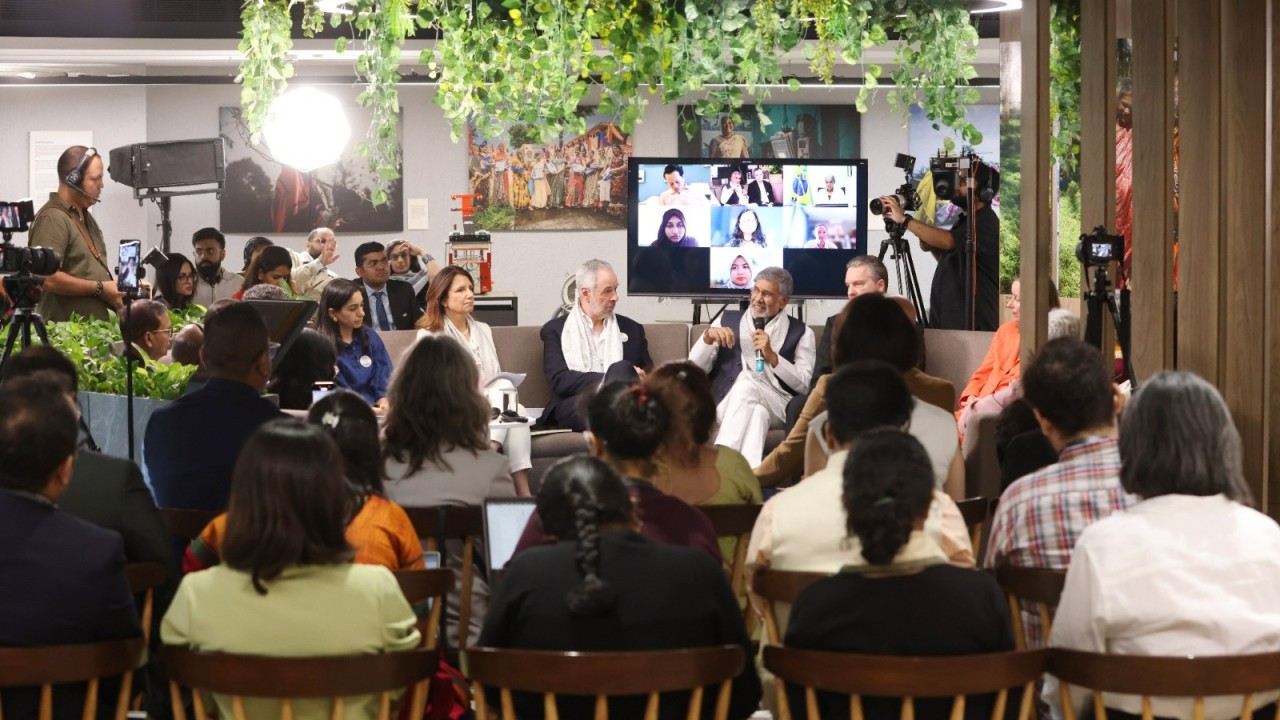Walking Together: Compassion at the Heart of COP 30
I had the privilege of co-hosting the 3rd Regional Dialogue of the Global Ethical Stocktake alongside Brazil in New Delhi last week. This gathering took place during one of the most challenging moments in our shared history. For the first time, the world is moving beyond numbers and targets to embrace an Ethical Stocktake, placing morality and ethics at the centre of climate action.
Brazil’s leadership in this effort is both bold and honest. President Lula, Minister Marina Silva, and their government remind us that progress without ethics is hollow. The world has never been wealthier or more advanced, yet the gap between those who are in authority and those who suffer continues to widen. We are in the midst of not only a climate crisis but an acute moral one.
The paradox of climate injustice is stark. In the past 25 years, the wealthiest 1% have emitted twice as much carbon as the poorest half of humanity. The United Kingdom, a single country, has emitted more carbon dioxide in the last century than all of the 54 countries in Africa combined, despite having a fraction of the population. Meanwhile, millions in marginalised communities pay the price with their lives, homes, and futures. It is tragic that despite the Paris Accord and the Sustainable Development Goals, we have not yet achieved our targets. The world does not lack wealth, intelligence, or technology. What it lacks is compassion as the guiding principle of development.
India’s ancient wisdom has long warned us against this imbalance. Bhumi Mata Putro Hum – the Earth is our mother, and we are her children. The universe is like a fragile nest: interdependent, delicate, and shared among all. Today, our mother is crying, our home is burning, and the question is not whether we can act, but whether we will act with compassion.
Compassion is the force born from feeling the suffering of others as one’s own, that drives mindful action to end that suffering. It is not passive; it is a disruptive, dynamic, and transformative force. Without the power of compassion, ethics and morality may remain rhetoric and hollow preaching.

That means protecting fragile ecosystems, respecting indigenous knowledge, and ensuring governments are judged not by their declarations but by their deeds. Are emissions genuinely declining? Are investments reaching sustainable infrastructure? Are leaders leading by example? Actual progress requires us to rethink how we consume, produce, and trade, as growth that destroys the foundations of life cannot be called progress. Compassion asks us to balance our needs with nature’s limits and to care for the nest we all share.
Behind every climate statistic lies a human story: children displaced by floods, families uprooted by drought, young people stripped of education and hope when their communities collapse. Many are left vulnerable to exploitation, including trafficking. I have felt their helplessness and pain when my colleagues and I personally rescued thousands of enslaved and trafficked children. They do not seek pity; they seek fairness. To honour their demand, we must listen to those most affected and give them a voice in shaping the solutions.
A just transition from fossil fuels to a renewable economy is non-negotiable; it is the foundation of a fair climate response. Communities must be equipped with the skills and livelihoods needed to participate in the green economy, ensuring that no one is left behind. Socio-economic rehabilitation and training must protect dignity while creating genuine and lasting pathways to opportunity.
Such an approach builds more than jobs – it builds resilience. Social, economic, and ecological resilience will enable communities not only to survive climate shocks but also to thrive in a future that is both sustainable and just. Renewable projects must be designed to empower rather than displace, rooting development in local ownership, dignity, and justice.
Yet even with our best efforts, the impacts of climate change are already upon us. Floods, droughts, and storms will not disappear. Adaptation is no longer a choice, but a necessity – one that must be pursued with compassion. This means strategies that protect dignity, strengthen resilience, and offer opportunity to those most at risk.
This also applies to finance. Too often, climate funding is promised but not delivered, or arrives with conditions that weaken its purpose. What is needed are independent moral audits, shaped with and for marginalised communities, to ensure commitments translate into real change. Without moral credibility, numbers and pledges hold little meaning.
The Global Ethical Stocktake is not simply about measuring progress; it is about evaluating compassionate actions. Let us hold leaders accountable, demand fairness in finance, invest in people as much as in infrastructure, and place ethics at the heart of every decision. Let us ensure that when we build, we build for the most disadvantaged.
Now is the moment of choice: apathy or compassion, delay or action, indifference or justice. The choice is ours alone, but the consequences belong to all.
